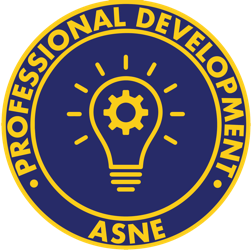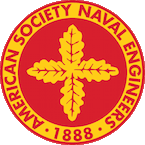 You are an incredible candidate with great understanding of naval engineering. Your new mission is to convey these strengths as quickly as possible. The hiring managers who will receive your resume and application are incredibly busy. Take charge of this situation by crafting a strong, succinct resume makes the best initial impression.
You are an incredible candidate with great understanding of naval engineering. Your new mission is to convey these strengths as quickly as possible. The hiring managers who will receive your resume and application are incredibly busy. Take charge of this situation by crafting a strong, succinct resume makes the best initial impression.
Customization is key. Your most critical decision is deciding what makes you special for this job. For sanity sake, you may want a strong general resume, but please consider whether you should reorganize to shift emphasis based on each position you apply.
Take a moment to write down the 2-3 things that you most want to discuss in a potential interview. Those are the things that you need to highlight in the prime real estate of your resumes.
This page provides:
- Overview of Resume components
- Options for Resume formatting
- Cover Letter components
- Honing word choice and finding/fixing errors
Your universities also have excellent Career Services departments that can review initial drafts of resumes and help discuss strengths and weaknesses. When you get your professional resume together, you can email it to us for a quick feedback from the industry (education@navalengineers.org). If you have any further questions about these resources, please email us at any time.
1. Resume Components
There are many sections you can include to highlight what makes you a uniquely strong candidate. Because you are student, you will want to highlight your education and relevant courses right away. You will also want to highlight the unique experiences that make you the best candidate for the position. Did you lead a senior design project? Present independent research? Participate in a classroom project with a tangible final product?
These sections will help you organize and celebrate your unique accomplishments.
-
Heading
List your name, e-mail address, and phone number. If you have room, include a mailing address as well.
-
Education
State the name of your college(s) attended, their locations, the degree(s) you received or expect to receive and those dates. In addition, be sure to list any study abroad experiences separately. If you have a GPA above a 3.0, you may want to include it as well.
-
Relevant Courses
Think about your 300 and 400-level engineering courses. List the ones that pertain to the types of engineering you expect to do in this job. You may have a different list of relevant courses for different jobs.
-
Honors, Awards and Recognitions
Time to show off! Make a bulleted list of the awards you have earned (consider: academic scholarships, Dean's List, honor societies, etc.). Only include scholarships that are based on merit. If you do not have anything like this, just exclude this section and expand more elsewhere.
-
Professional Experience
Employers know that this section will be short, but use it to demonstrate that you are ready to be their full-time employee. You will want to share at least three examples if possible. If you have more than five professional experiences, prioritize them in this order:
- Full-time engineering/STEM work
- Part-time engineering/STEM work
- Engineering Internships
- Other full-time work
- Other part-time work
- Summer jobs
- Volunteer experience
- Extracurricular activities
For each position, list the company/organization, its city and state, the position you held, and the dates of your involvement. If this experience is a big asset that you want to share, then write a succinct summary of the work you did and the results you achieved. These details should include specific numeric achievements or describe tangible products created. You want to show that you achieve results.
Only include details that you want to be sure to discuss in a follow-up interview. Space is precious!
-
Skills
Engineering companies want to see that you are competent in computer languages and programs, so that you can learn their processes and systems quickly. Be sure to list the languages and software programs that you have mastered. In addition, you may want to include laboratory equipment and research techniques that you have mastered. Make sure that each skill you list can be demonstrated (avoid the generic "enthusiastic worker").
-
Activities & Organizations
Show your commitment to engineering and the larger community by listing the professional associations, student organizations, and community involvement you support. Be sure to highlight any offices you are holding and any initiatives you helped lead. After these engineering activities, you may choose to list music, sports, arts, etc. interests if they show a true dedication that will help employers see you as a dedicated and passionate individual. Please note that you should be careful about listing organizations that may be perceived as extreme by potential employees.
-
Summary
A second approach is a summary of qualifications describing your skills and experience in relation to your career interest. Qualification summaries are less widely used than objectives, but offer the opportunity to highlight your most important assets at the top of your resume. If your career interest is in working as a legislative aide, for example, you could summarize your most important accomplishments and skills in this way.
-
References
We suggest excluding this section entirely unless you have a reference that would capture the attention of an engineering HR executive. Some sites suggest simply listing "available upon request", but we find this as a waste of space that you can use better in the sections above.
-
Publications & Presentations
An important section for graduate students, but not expected for undergraduates. If you have published your thesis, definitely include it using a formal citation. If you have published a paper or presented a poster, this is the place to show off your academic accomplishments. (And, if you are using this guide as a checklist for what to accomplish, please seek out these publishing and presenting opportunities. They show initiative!)
-
Objective
Some people love objectives, but they are not very necessary. They share your specific career goal, which can help frame the interview; however, most positions for recent college graduates are highly specified so you will fit the job rather than the job fitting your goals.
2. Resume Formatting
The most important quality of a resume format is that it clearly highlights your experience, education, and skills. A good template will help you use the same fonts, use font size and bolding to emphasize the structure, and rely on black and dark color texts that will stand up to printing in gray scale. We also advocate for using something that is a bit interesting so it will stand out in a stack. "Interesting" does not mean anything crazy. This example from Carnegie Mellon uses a long vertical line to provide an easy-to-follow structure.
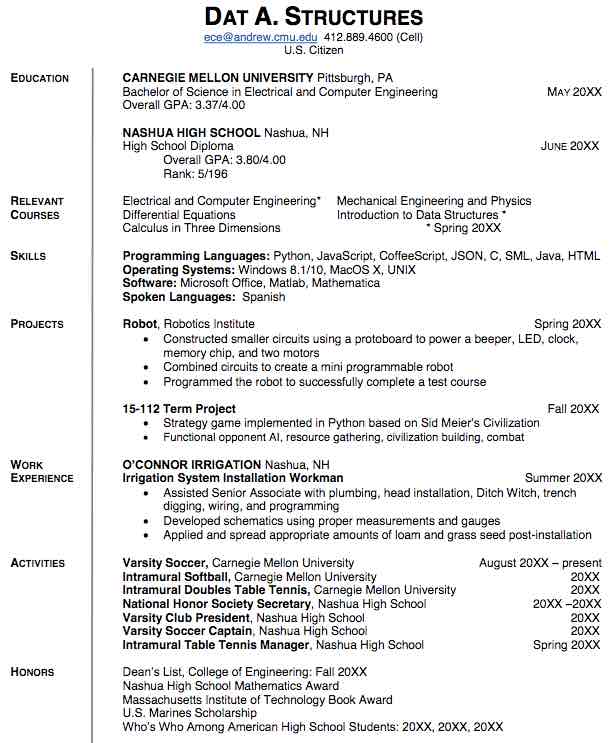
Should I pay for a resume writer?
Short Answer: No. Long answer: You know what makes you unique. You can describe and organize what you want to show off better than anyone else. Now, you may want to pay for a friend's coffee or buy a family member a flower in exchange for giving you honest feedback (and grammatical edits) on your first draft. You can also contact your professional societies, like ASNE, for feedback.
Naval engineering students need to pass rigorous courses and hopefully engage in collaborative projects. It will be important to share with hiring managers your content knowledge and your engineering expertise. You should lead with your education, then include what makes you special (courses? work experience? leadership?). You will need to show work/volunteer experience.
This example shows another possible layout but essentially shows the same information. You see that education and job experience are still taking up the most room, and it includes suggested citations for posters and published papers.
The last thing we want to mention on resumes is to emphasize is customizing resumes and cover letters for each position. Your application will be in a stack with others; you want to be the applicant that directly speaks to the job requirements and expectations. This customization helps your future employer see you in the position before you even have an interview.
This video from Widener University provides even more reasons for customizing your resume.
The templates! Here are 3 Microsoft Word templates you are free to use to organize your resume. Feel free to add and remove sections as it makes sense.
To download, click the image above or the file names below.
3. Cover Letter Components
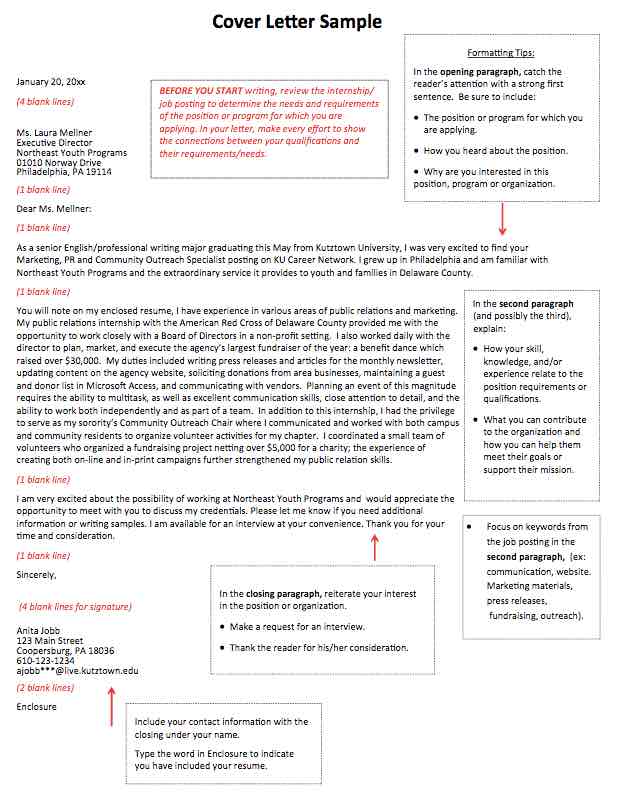
Kutztown University produced the above description of a Cover Letter components.
4. Honing Word Choice & Fixing Errors
You only have a handful of seconds to make an impression with the HR manager so be sure to choose your words wisely! Use words that accurately portray your commitment and breadth of experience in the industry. They should drive the impression that you want to make by showing your leadership and depth of knowledge. Instead of saying you "helped', describe what aspect of the project you "led" or "executed". Be sure to highlight the accomplishments of your work, rather than simply listing what took up your day. HR managers want to see results!
And, HR managers do not want to see typos! You have to make sure your resume is completely clean and anything you send in your application should show that you are strong at editing your work.
Tufts University has greater resources for engineering students. This is page 4 of 16 from their excellent resource. Download it directly to see more wording advice and resume templates
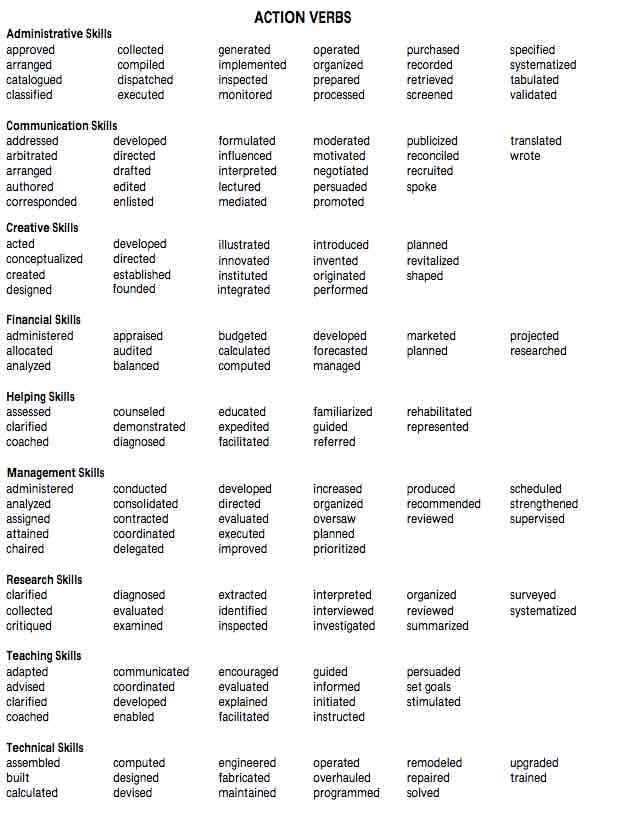
This silent film from Virginia Tech has great facts and advice for job seekers.
Looking for Additional Support?
Many people learn better through videos and repetition of ideas. If this sounds like you, please check out this free 90-minute resume module by Niagara College:
Additional Resources
Please consider these excellent resources as you create, revise and customize your resumes and cover letters:
The Critical Next Step: LinkedIn
After you create your resume, please get it up on LinkedIn as soon as possible. Recruiters use this tool to search for candidate and it will give you resume even more exposure. Be sure to look at profiles for companies and people that you would like to work with; What key words do they use? What titles are they using? Tailor your online resume to the industry you are hoping to join.
Like any other social-networking site, the more time you invest on LinkedIn, the more it will provide benefits to you in the long term.
The ASNE group has over 3,000 connections, which can help you find employment opportunities not listed elsewhere.
